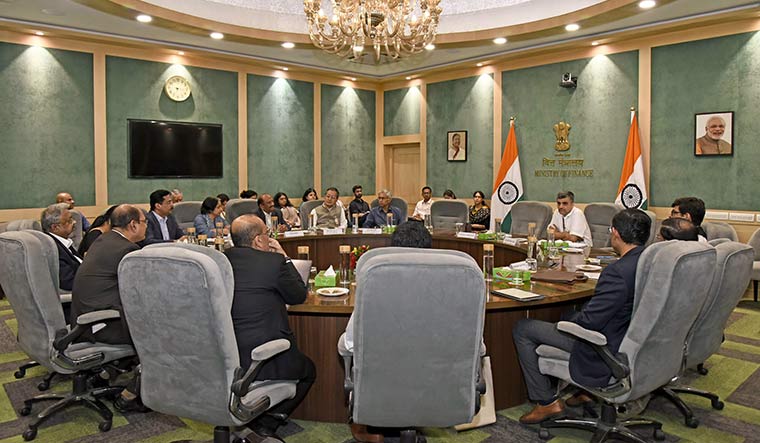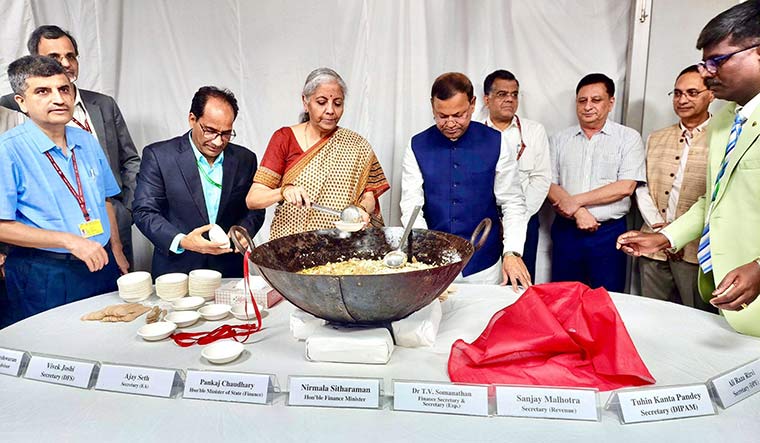It is not in the nature of Droupadi Murmu to give surprises. The president follows the decorum and sticks to the protocol. But while reading out the government’s vision document in Parliament, her first address after Modi 3.0 took charge, she dropped a bombshell.
“This budget will be an effective document of the government’s far-reaching policies and futuristic vision. Along with big economic and social decisions, many historic steps will also be seen in (it),” she said, referring to the upcoming full budget to be tabled in Parliament on July 23. She also pointed out how India was the fastest growing major economy, averaging 8 per cent in the past four years.
If Prime Minister Narendra Modi wanted a murmur of anticipation to precede Finance Minister Nirmala Sitharaman’s first budget of the new government, that speech achieved its goal.
India had embarked on radically pro-market reforms after the Covid-19 pandemic. Some of these measures even topped up the economy outside of the ambit of the annual budget exercise, like the slashing of corporate tax for new businesses back in 2018, the Atmanirbhar Bharat and the Vocal for Local rejig or even the production-linked incentives (PLI) announced for various sectors from time to time. The budget itself had stuck to the script, coming out year after year on February 1 with consistent announcements of major capital expenditure plans―all in an effort to boost the economy by wooing in precious investment. It did not change even on the eve of the Lok Sabha elections.
All that is water under the bridge, or votes won or lost across the hinterland. With the Lok Sabha election outcome turning out to be what it was, there is speculation galore about any route deviation in Nirmala Sitharaman’s spending principles. Murmu’s speech just turned it into a deafening murmur.
So how different will the budget for 2024-25 be? The hearts of India Inc would brook no tinkering in the government-industry tango that had seen big splurging on infra projects. But the heart of Bharat, as the poll results indicate, sways to a different beat. What tune will eventually get played?
SHOW ME THE MONEY
Upasana, an interior decorator in Gurugram, loves Kapil Sharma shows and Bollywood movies but switches to news on the budget day for one thing―to see if there is a cut in income tax.
Income tax cuts are a sure-fire formula to ignite the middle-classes. But why would a government that did not bother to dole out tax reliefs before election do it after the polls? “I think the election results have been such that the government is under pressure to do something to cater to the electorate in some way or the other,” said Sethurathnam Ravi, tax specialist and former chairman of the Bombay Stock Exchange. “In any case there are some crucial assembly elections coming up in a few months.”
 Brainstorming: Ajay Seth, economic affairs secretary, holding a pre-budget meeting with experts | PIB
Brainstorming: Ajay Seth, economic affairs secretary, holding a pre-budget meeting with experts | PIB
Shashank Pal, chief business officer at Prabhudas Lilladher Wealth Management, said there were three aspects to it. “The expectation is that basic tax exemption limits would be hiked,” he said. “Second is in terms of the benefits against insurance and for senior citizens. That would go up. And third is in terms of the tax slabs. That is expected to increase.”
An array of taxes are under the scanner, if the buzz is to be believed. Corporate tax, which was slashed in the first Modi regime’s push to get companies to set up shop in India, could see a rejig. New-economy companies are pinning their hopes on getting relief from Angel Tax, which is applicable to investment received by startups and the like.
LET THERE BE JOBS
Jobless growth has been the inherent irony of India’s economic growth in recent years. Before the Lok Sabha elections, both industry doyens and economists said in one voice that the main focus of the new government should be creating jobs. “There is a need to create a lot of quality jobs,” said Sanjiv Puri, president of CII and chairman of ITC, a week after the new government took over. His suggestion? An investment-led growth. “Investment creating jobs and consumption creating a virtuous cycle,” he said. There are, however, others who beg to differ, pointing out how years of big capital investment has not led to the expected boom in jobs.
Going back to the drawing board, what will South Block’s number crunchers come up with?
“We can expect a continuation of the big infra push,” said Ravi. But it will be with a twist. “With more on the rural areas than urban ones,” he said.
If spending can catalyse economic growth, spending in rural areas will be tantamount to killing two birds with one stone. Of course, with a specific focus on Bihar and Andhra Pradesh, home of the two parties propping up the coalition government at the Centre.
Focusing on small industries could help in this. “MSMEs suffered during Covid. Many got shut because they could not cope with the aftermath of the pandemic. Their rehabilitation has taken time,” said Ravi. There are expectations of a push through the budget to revitalise this crucial sector. “Initiatives geared towards stimulating job creation, particularly through robust support for small businesses, will foster a thriving economy,” said Jitendra Patil, a Pune-based startup entrepreneur.
NATURE’S BOUNTY
Despite the big infra push, the overarching shade in this budget is likely to be green. “There have been significant provision in the last budget on green energy, especially in terms of wind, solar and other non-fuel based energy sources. But in terms of trying to spread out, incentivising solarisation, transmission by the discoms and creating infrastructure, there is an expectation that there would be further concessions, liberties, discounts, rebates and cheaper availability of credits,” said Pal. With a National Green Hydrogen Mission already up and running, he feels that green hydrogen, too, is “expected to get some boost for creating infrastructure.”
And there are promises to fulfil. “You have to give incentives because India has made huge commitments to net zero and clean energy,” said Ravi. “Institutionalising net zero carbon goals through the budget could help―the cost of funding will come down as there are many global funds who finance [such projects] at lower costs. While the last budget also mentioned sustainability, this budget’s announcements will be more granular and progressive.”
THE GIST OF IT ALL
Decisions on the Goods and Services Tax are taken by the GST Council. But it is likely to make a transformative appearance in this year’s budget speech, even if the nitty gritty will be left to the GST Council. “Rationalisation of GST is critical,” says Rahul Ahluwalia, co-founder of the Foundation for Economic Development. “If you include luxury tax and cess, we have six or seven slabs of GST. Experts have consistently said that we should have only one slab. If there are political compulsions, have two, or at most three.”
Ahluwalia also tries to make a strong case against high tax rates. “The government has been trying to use tariffs strategically to cut down imports,” he said. “By and large, that has not worked. India has traditionally tried to use tariffs as a way to protect our industry. But it is actually the liberalisation of tariffs in 1991 that really promoted Indian industry beyond anything that had come before that.”
His argument is part of the big picture view that only exports will lead to growth, and that is where he has a problem with protecting domestic businesses with high import duties. “A tax on imports is a tax on exports, which is something we don’t often realise,” he said. “We think of ourselves as a big market, but per capita-wise, we are a small player. Unless we become export competitive, we cannot grow fast. We forget that from 1991, all of our growth has been export-led, though it started flattening somewhere around 2011. This government has tried, but our export has not picked up. Only fast growth in exports can lead to economic growth.”
OUT OF THE BOX
The use of phrases like ‘futuristic’ and ‘historic’ in the government’s vision document has triggered many theories about a grand announcement―a universal health care scheme, rejigging of the National Pension Scheme, or even a universal income scheme.
Pal would not rule out something as game-changing as an unemployment wage for those who are qualified, and a universal pension for those above 70 or 75, where “the government takes care of basic financial requirements”.
Such a move could take the wind out of the freebies the opposition parties have been promising, but has not the prime minister always been against revdis (handouts)?
“Modi has always expressed his displeasure, but a sobering election result would be enough to change your mind to do something dramatic like this,” said Pal. “If they want another term, they need something earth-moving.”


